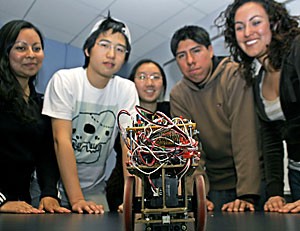Teaching a mouse to navigate a maze may be difficult using only cheese, but UA engineering students used sensors, wheels and artificial intelligence to move their electronic “”mice”” quickly to the center of a labyrinth.
A competition sponsored by the Institute of Electrical and Electronic Engineers involves building a robot that can navigate through a maze without using a remote. The “”mouse”” starts in one corner of a maze and must navigate to the center using trial and error. The competition was held Saturday at the University of Nevada at Las Vegas.
“”In a sense, it’s like navigating a wheelchair around in a room without hitting objects,”” said Hal Tharp, an associate professor of electrical and computer engineering and faculty adviser for the UA chapter of IEEE. “”That’s sort of what the mouse was having to deal with when it’s navigating the maze.””
The “”mouse”” itself was a small cubical robot that had ultrasonic sensors to identify openings in the maze. Battery powered and mounted on four wheels, the robot can “”learn”” where to move the mouse. Multiple runs through the maze result in faster times.
“”The first time it’s trying to explore the maze and figure out where it is and how to get to the center as quick as possible,”” Tharp said. “”After it’s done that, if it can get back to the starting square and begin again, it might be able to do the process much, much faster.””
The UA team won the regional competition in Las Vegas, with their “”mouse”” reaching the center of the maze in 49 seconds and beating their competition, the University of California at San Diego, said Tanuja Mouli, an electrical engineering junior.
The team won $500 for its victory.
UA teams began making their mice at the beginning of the fall semester in preparation for a local contest that was held two weeks ago at the UA. Three UA teams competed and the winner went on to Las Vegas, Tharp said.
An estimated 100 hours were put into the programming and manufacturing of the “”mouse,”” said Alonso Montesinos, an electrical engineering senior and team leader for the micro-mouse competition.
“”It took a lot of time and sacrifice from all our members,”” Montesinos said. “”We spent our spring break, about eight hours a day, just working on it, doing testing and debugging the program.””
While the actual competition was brief – lasting half an hour – the team members were nervous.
“”It was pretty nerve-wracking,”” said Denise Hernandez, an electrical engineering junior.
The competition, although time-consuming, was rewarding for members.
“”It was my first time going to Las Vegas and it was free,”” said Andy Yan, a computer engineering senior. “”We became such good teammates, we know each other so well because we’re always together eating lunch and we spent the whole spring break together working on the micro-mouse.””
The competition has also landed a few of the members a job following graduation. Yan also received a job offer from an employer who was interested in the competition, as did Montesinos.
“”I actually have an internship, and it’s due to that project mainly,”” Montesinos said.
While some of the seniors are graduating and will be unable to continue with the competition in the future, others are thinking of competing again next year.
“”I hope I can,”” said Hernandez. “”It all depends on how much time I have because it does take a lot of time and a lot of dedication.””









